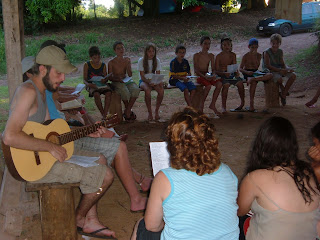
This past Thursday and Friday, July 24th and 25th, 2008, I was in Aristobolo del Valle, Misiones, Argentina with 600 farmers from all over the province of Misiones, and some from other provinces and other countries for the Seed Fair. The Seed Fair and the Seed Movement celebrated its tenth anniversary of seed exchange in Misiones. This exchange is extremely important for the entire province and country. Here’s some background….
Under the motto “seeds in the hands of the farmers”, the Seed Fair, as part of the Seed Movement, started to take form in the year 1997, in the city San Vincente, of the province Misiones. The objective of the fair, since it’s beginning, has been the exchange of genuine seeds of Misiones, without the exchange of money. Around this time, the pharmaceutical companies began the sale of transgenetic seeds, turning themselves into seed companies. These companies who create genetically modified seeds, have manipulated organisms in a laboratory in order to modify some characteristics, for example, creating resistance in their seeds to their own herbicides. These transgenetic seeds only grow with the use of the herbicides and the entire technological package that is created by the company. The companies sell their seeds at a higher price, and also require the purchase of the entire technological package. Also, when the farmers buy the seeds from these companies, they sign a contract, which prohibits the farmer to replant the seed year after year, requiring the farmer to buy new seeds year after year.
Many farmers in Misiones still purchase these seeds when they can cultivate, save, plant and exchange their own, genuine seeds for free year after year, and decide their own destiny. These transgenetic crops create political, economic, social and cultural dependency. They also create dependency on agro-chemicals, promoting monocultures in agriculture, which threatens the environment and puts food security at danger. Agricultural biodiversity is necessary for security and knowledge of food and the independence of the people!











